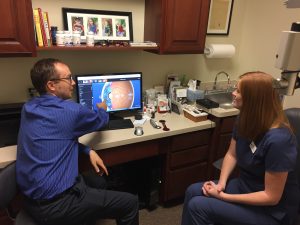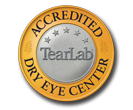 Is it true that Dry Eye Symptoms are more severe in the winter than warmer times of the year?
Is it true that Dry Eye Symptoms are more severe in the winter than warmer times of the year?
Yes, Dry eyes symptoms are more severe in the winter both due to the cold temperatures and more commonly exposed to wind. Cold temperature and wind can both cause dry eye problems by evaporation of the tear film fluid which irritates the eye.
When a person comes to see an optometrist like yourself for their dry eye symptoms, they could feel that their eyes are excessively watery, painful, red, or itchy. What stages of dry eye do you take care of at Belill Eye Care? Is there a point that you would need to refer to someone else?
In almost every case, I’m able to take care of it. As far as patients with symptoms of watery, painful eyes, itching, or burning sensations, most likely those symptoms are from two causes. Poor tear film quality causing dry eye syndrome or irritations from allergies or seasonal allergies. So, the difficulty with those two, dry eye versus allergy eye, is the many crossovers in the symptoms between them. Normally we think that itchy eyes mean allergy, and burning eye means dry eye, but that’s not always true. Sometimes, people with allergy eyes complain about burning and dry eye patients complain about itching. When a patient presents us with symptoms like itchy, burning, sensitivity to winds, sensitive to fans, or  fluctuating vision then we can do a validated lab test right in the office to get instant results.
fluctuating vision then we can do a validated lab test right in the office to get instant results.
Is that the TearLab?
That’s the TearLab! I can order TearLab testing that my assistant can perform, and we can get accurate results within 5 minutes. Having a validated lab test can tell us which of their symptoms are related to dry eye or allergy eyes. If the TearLab test is abnormal, not only does it confirm a diagnosis of dry eye, but the test can help us categorize whether or not mild, moderate, or severe disease. Then, we can target our dry eye treatment accordingly. For example, if a test was abnormal, and that person had some form of allergic disease, we can target our treatment using antihistamine or more anti-allergy treatment. This is opposed to starting on one dry eye treatment or the other to see what works. That method is destined to fail because without an accurate diagnosis, your dry eye treatments will be ineffective.
 Do you use a TearLab test for everyone who comes in reporting dry eye or allergy symptoms? Or does it depend on the case?
Do you use a TearLab test for everyone who comes in reporting dry eye or allergy symptoms? Or does it depend on the case?
It depends on the case because somebody might report that their eyes itch, but, on further investigation, that eye itch could have happened one time over 6 years ago. We’re not going to order the TearLab testing right away. We try to found out through questions, and sometimes through validated symptoms surveys. We want to know not only what symptoms they’re having, but how severe are the symptoms and how frequent are the symptoms. Any patient who has symptoms that are mild but very frequent, or a patient with severe, infrequent symptoms are a lot more likely to run a TearLab test because that person is a lot more likely to benefit from dry eye treatment.
As far as your practice, what is the demographic of patients who come in for dry eye or eye allergy treatment? Any particular group more than others?
More commonly, patients over 50. More commonly female than male.
Would they have had a prior history or anything? Or do these symptoms simply vary from end to end — who has dry eye and who doesn’t?
It can vary. People who are more likely to have it will be older. They’re generally taking numerous medications, where some medications can cause dry eyes as a side effect. Sometimes they’ve had a previous surgery on their eye, whether through LASIK surgery or cataract surgery. Both of those surgeries injure the cornea in order to do the operation. The cornea is vital in helping your tear film system work properly. Dry eyes is a common side effect for patients whose cornea has been damaged after eye surgery. This can either short-term or long-term dry eye symptoms after having those types of eye surgery. On the other spectrum, younger people come in for dry eye or allergies like teenagers or people in their 20s and 30s, and can be mainly associated with the fact that they’re looking on a computer screen for 12 hours a day. They are blinking in a way that they shouldn’t which can cause dry eye problems as well.
